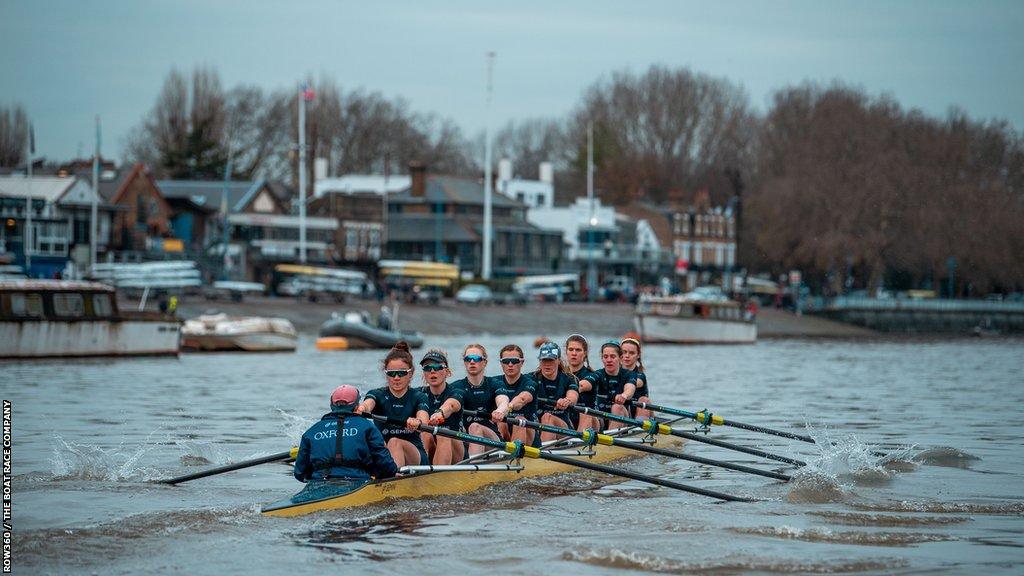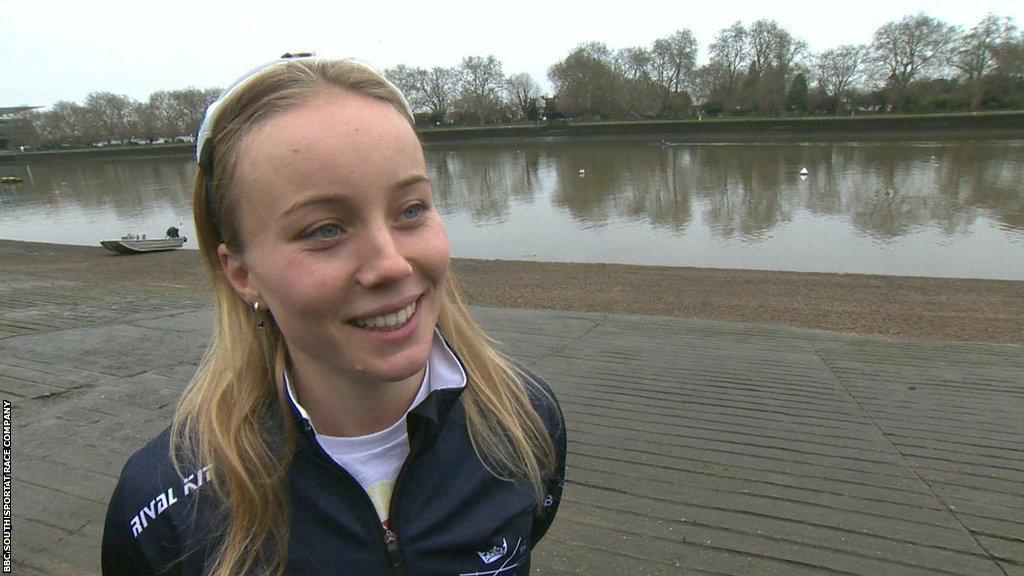The Boat Race: Oxford hope to strike back as selection process begins
- Published

Oxford University women's crew have not won the Boat Race since 2016
One of rowing's most distinguished events, the Boat Race, is still months away but Oxford University Boat Club have already staged rehearsals for the legendary races.
Rowers from both Oxford and Cambridge universities will take to the iconic 4.25-mile Championship Course on the Thames on 30 March 2024, the 169th men's and 78th women's races.
After the famous light blue of Cambridge took a clean sweep in the 2023 edition, both teams have begun their selection process for next year's event by hosting their Trial Eights.
A traditional event in the build-up to the race, the Trial Eights marks a major occasion for rowers vying for a spot in the races. Coaches of both sides recruit their best 16 rowers to race against each other, to see who can handle the pressure of the big day.
"It's a long process, there will be people that don't quite make the cut at different points," said Siobhan Cassidy, chair of the Boat Race Company Limited.
Cassidy, who won the Boat Race with Cambridge in 1995, knows what it takes to get through the selection process. She added to BBC South Today: "Some people perform differently under pressure from maybe the way they have been performing in training.
"There will be some students who will have been ill and injured, it's the end of term - they've got exams and papers to finish. They're balancing intense training sessions with full-time degrees as well. It's not easy.
"Everyone is desperate to be in one of the crews and everyone is desperate the win the race, so you have got that intense internal competition in the teams."
The Trial Eights are the only prior opportunity that the clubs get to race the full Championship Course, which goes from Putney to Mortlake. It is a major chance for up-and-coming rowers, or even past stars, to show the selectors they have what it takes.
While allies may become enemies just for the day, as they battle it out for the top eight spots, plus the coxswain, the rehearsals are still a chance for the squad to bond as a whole.
"A lot of people won't have done a Trial Eights before and even if you've been rowing at various clubs or schools across the country, you may not have experienced the intensity of the event," said Cassidy.
"Everyone who comes away [from this], it is a really difficult thing to do to race your own team, but they'll all get together and celebrate their success. To have reached this part of the season itself is quite an achievement."
Boat Race legacy lives on
The Boat Race has been a staple in the British rowing calendar for decades, with the first men's race taking place in 1829, and annually from 1856, while the women's event began in 1927.
Outside of the Olympics, it remains the most-watched rowing event in the UK.
"Everyone loves strong rivalry and that light and dark blue, Oxford v Cambridge, that intensity of competition is still there," said Cassidy.
"There is something about [it] that has stood the test of time. The combination of those two things will retain relevance through the eras."
Generations of rowers have taken part in the spectacle, and their past achievements are still felt today by those who are trying to emulate their successes.
Oxford men's crew have only won one of the past five instalments of the competition, in 2022, and they will be looking to regain their title with the backing of their predecessors.
Saxon Stacey, who is hoping to land a spot on the team, said: "It's the biggest sporting event in rowing. There's all the history, we've had a lot of the alumni around this year. [To get there] It would be the culmination of so much work."
When asked if the history of the event gives him confidence or builds pressure, Saxon responded: "Both. You know a lot of people have done it before, but there is pressure, you do know that this is a continuation of a massive legacy.
"Cambridge have six winning blues, we are aware of that, we're committed to training hard. We know we have a big job to do but we can do it, the underdogs can manage it."
Cambridge's dominance in the event is not just limited to the men's race, the women have had it worse - losing six races on the bounce dating back to 2016, but president of Oxford University Boat Club, Ella Stadler, who raced last year, thinks this time will be different.
"It is obviously in the back of my mind [that Oxford lost last year], I want to win," she said.
"We've got a great opportunity this year, we've just merged, we've got a new coach, we've got great new resources, opportunities ahead of us. I really believe in the group of women."

Ella Stadler, president of Oxford University Boat Club, is looking to avenge last year's loss
Boat Race 'great to access the sport'
The Olympics is the pinnacle for many rowers and with Paris 2024 coming up, this year's Boat Race could show viewers what to expect when the famous Games roll around.
Cassidy is hopeful that the Boat Race's legacy in providing Olympic athletes can spur people on to take up the sport.
"We are really proud of the heritage that both Oxford and Cambridge have of Olympians being developed through these programmes," she said.
"Most of the women's Olympians from Oxford and Cambridge learnt to row at university - that's really exciting.
"As an event it is great to access the sport so that people can see it, for a lot of people you will hear them say 'the first time I saw the sport was watching the Boat Race on the BBC' - that inspires them. Maybe they will then move somewhere where there is a river and they can take it up and enjoy it."